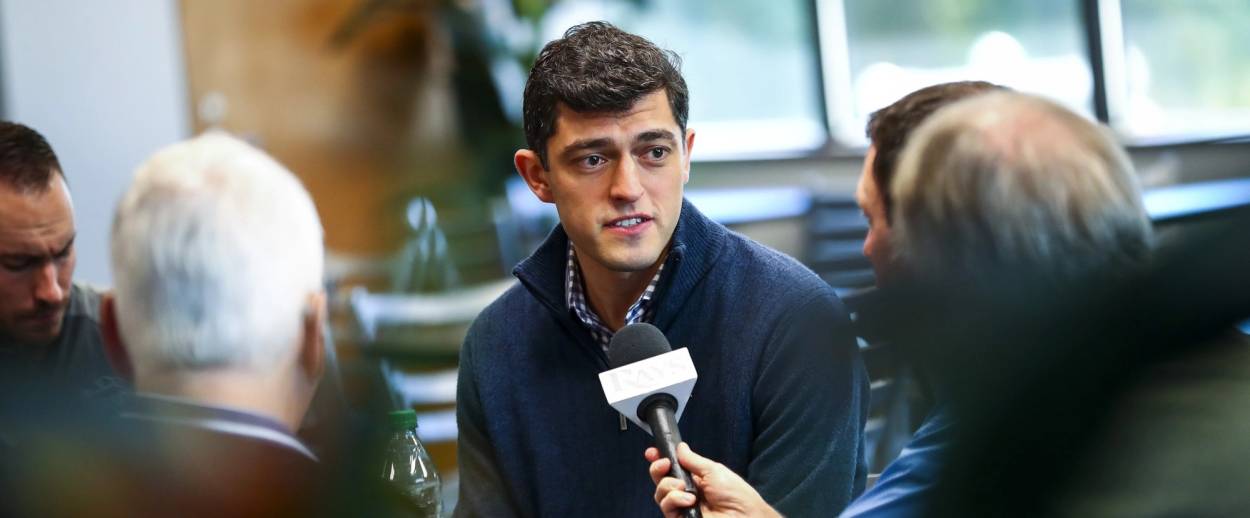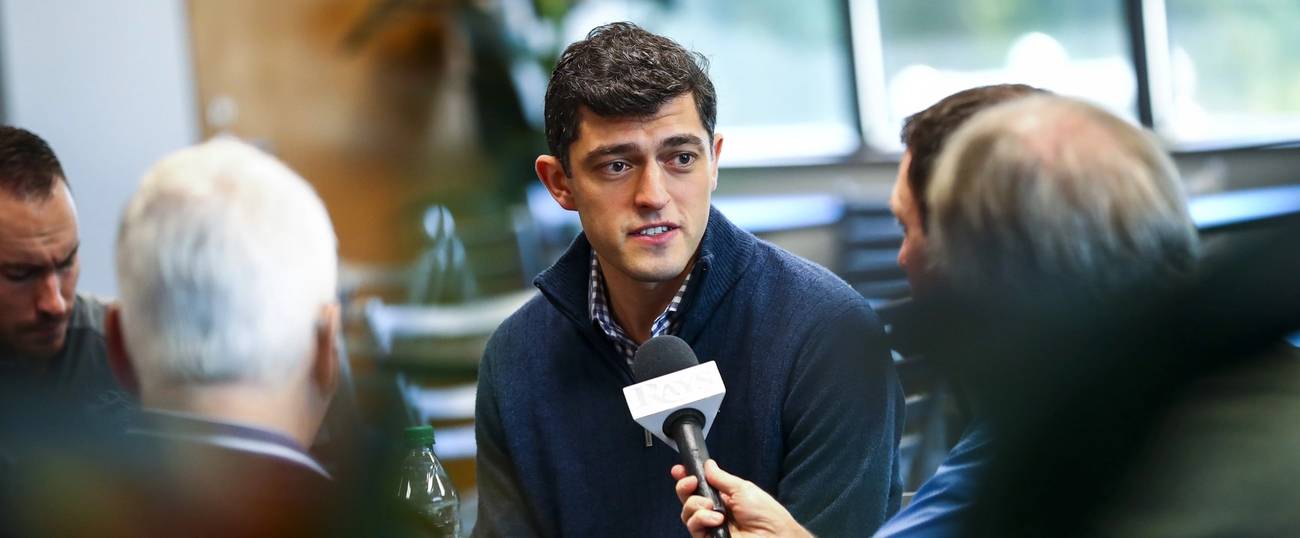What To Expect From Chaim Bloom, The New Head of Baseball Operations for the Boston Red Sox
The former Tampa Bay Rays vice president is about to take over one of baseball’s biggest franchises




When I profiled Tampa Rays vice president Chaim Bloom before the baseball season, it was already clear that the 36-year-old was a man in demand within the industry. Flashforward to today, and the Boston Red Sox—one of the sport’s premier organizations—are holding a press conference to announce his hire as their new director of baseball operations. It turns out he was the only external candidate that the Red Sox interviewed, a testament to their regard for Bloom.
What can fans expect with Bloom at the helm of one of baseball’s best franchises? Here are some things I learned about his worldview and leadership style while shadowing him that didn’t make it into that April profile:
1. Bloom admires Yankees general manager Brian Cashman—and now gets the chance to go toe-to-toe with him. Both Bloom and his wife Aliza told me that he has great respect for Cashman, who has run the Yankees front office since 1998. Specifically, Bloom admires how Cashman overhauled the Yankees on the fly from being a big-spending club that relied on pricey free agents to a leaner, more strategic organization focused on player development and spotting underutilized talent. (Days before the 2019 baseball season began, when Yankees fans were still miffed that the team had not signed superstars Manny Machado and Bryce Harper, Bloom told me that fans would be happy at the end of the year that Cashman had acquired a little heralded minor league outfielder named Mike Tauchman. Tauchman ended up playing a major role in a Yankee outfield decimated by injuries.)
The Red Sox, the Yankees’s perennial rival, are now in the midst of a similar evolution. Bloom’s predecessor, Dave Dombrowski, built a championship team through splashy signings of expensive free agents like J.D. Martinez. But now, after a failed season, Red Sox ownership has made clear that they want to reduce payroll and get under baseball’s luxury tax—all while remaining competitive. It’s a pivot that Cashman successfully pulled off, as did Bloom’s former mentor Andrew Friedman with the Dodgers. Now it’s Bloom’s turn.
2. Bloom considers “candor,” particularly about difficult decisions, to be essential to effective leadership. As VP of the Rays, the team with the lowest payroll in baseball, Bloom had to help make many agonizing calls to best optimize the organization’s limited resources. That often meant letting go of beloved players, or making unorthodox decisions on the field, like instituting the “opener” in place of a normal starting pitcher. As a result, Bloom has a lot of experience making tough decisions and communicating them to fans and players. As the Red Sox struggle to get under the luxury tax, and weigh letting go of homegrown stars like Mookie Betts and Dustin Pedroia, he’ll doubtless be drawing on that experience.
“One of the things that I have learned the most as my career has progressed is the value of being straightforward in conversation,” Bloom told me. “When we’re talking to staff and talking to players, Candor is underused and underrated. In the long run, sugarcoating things or avoiding some difficult things has a short term payoff, but in the long-run is very detrimental and you don’t even get what you did it for. It’s not easy or automatic, because most of us have an impulse to be agreeable, but you probably get more respect from it. People know that when you tell them something that you mean it. They don’t have to agree with it, they do not necessarily have to think you’re correct, you can’t always promise them that you’re correct, but they know that it’s an accurate representation of what you’re thinking and willing to stand behind it.”
3. Bloom prizes communication, not just calculation. With the lowest payroll in baseball, and one of its best records, the Rays rightly get a lot of plaudits for their advanced analytics that have put them ahead of the competitive curve. But Bloom, while appreciative of and fluent in the latest models, is far from some stathead with spreadsheets, despite what some might think from his youth and Yale background. For him, crunching the numbers is only half the battle. The other half is building an organization and forging the human relationships that enable a team to easily turn the data into action. This can mean explaining to a player how a certain swing or pitching change can help them succeed, or teaching them to separate proper process from results—one of the greatest challenges in analytical era baseball, where the stats can tell one story even though a player’s instincts might tell them another. The secret to accomplishing this, said Bloom, is doubling down on people.
“As more and more information has come into the game, I think there was this fear when I got here that this was going to deemphasize the importance of people,” Bloom told me. “But we’ve actually seen the opposite. We’ve seen staffs around baseball grow dramatically. We’ve seen greater investment in people. And I think part of that is because it’s harder to get the necessary advantage just on information alone. Everyone has good information now. It’s really all about what you do with it, and that gets back to who your people are and how they’re working together.”
“At the end of the day,” he added, “everything you do on the field can be reduced to numbers, to wins and losses, but behind those wins and losses to me is a lot of hard work, and how you get there is everything. The personal side to that and the relationship side to that more than anything gets me up in the morning.”
4. Bloom simply loves baseball. “This is the most terrifying thing about Chaim, but it’s also the thing I love about him the most,” his wife Aliza told me. She proceeded to relate the following story to illustrate his passion for what he does. One day, in the middle of the summer, Bloom came back from an off-season High A game. This was a low-level league filled with 19-year-olds, playing in the 99° August heat without the comforts of a traditional stadium setting. When he got home, he started telling her about how a legendary former general manager, now age 81, was at this game, working as a special assistant scout for one of the teams. “He says, ‘this guy was a GM for 20 years, and he’s still working as a special assistant scouting GCL [Gulf Coast League] games.’ And I’m like, ‘oh my god, that’s your hero.’”
“That’s what he likes,” Aliza said. “He’s a lifer in his love and passion for this, and while that’s a little terrifying for what our 70s and 80s are going to look like, I think it shows that his passion for this game still exists like it did when he was an intern.”
Yair Rosenberg is a senior writer at Tablet. Subscribe to his newsletter, listen to his music, and follow him on Twitter and Facebook.